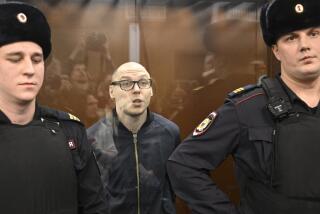Maverick Soviet Poet Attacks Censorship and Privileges for Elite
- Share via
MOSCOW — Soviet poet Yevgeny Yevtushenko, who gained fame as a young rebel in the 1960s, launched a wide-ranging attack on some forms of censorship and special privileges for the Communist elite in a recent speech to a writers’ congress, it was disclosed Wednesday.
Excerpts from his address on Dec. 12 to a closed session of the meeting were printed in the weekly Literary Gazette, the newspaper of the writers’ union, and a full text was provided to some Western correspondents.
Yevtushenko, now 52, often has been critical of some aspects of Soviet life, but his foes say he also never goes so far as to jeopardize his place in the cultural Establishment. A novelist and film director as well as a poet, he is perhaps the contemporary Soviet writer best known abroad.
His latest speech contained a rarely heard reference to the “merciless extermination” of Red Army officers, intellectuals and Communist Party dissidents under the late Soviet leader Josef Stalin.
But he did not mention Stalin by name and this passage was not among the published excerpts.
Yevtushenko also spoke out against refusal by government officials to approve controversial movies, delaying their showing for years. He has had personal experience of such problems; authorities once withheld for several months approval of a semi-autobiographical film about World War II that he directed.
“Time itself demands the abolition of the barrier psychology,” he said.
According to the full version of his speech, Yevtushenko criticized food rationing in some Soviet towns and assailed special buying privileges for those at the top.
“Any form of closed food and commodity distribution is morally impermissible, including special ration cards to visit souvenir kiosks that are in the pocket of every delegate to the congress, including mine,” he was quoted by the Associated Press as saying.
In challenging the gaps in official histories, he said: “We do not have the right to keep silent about the fact that (in the past) . . . the precious economic ideas of many middle class farmers and unjustly accused kulaks”--well-to-do farmers who owned land--”were trampled down and that there was a merciless extermination of Bolshevik ‘guards,’ the best commanders of the Red Army and industrial cadres, the leading representatives of Leninist thought.”
His reference to these groups, all of them persecuted in the Stalinist purges, also did not appear in the newspaper version of the speech.
Yevtushenko also said, “The fear of a creative analysis of our revolution has led us to the flagrant, unacceptable fact that in the series of ‘Lives of Famous People,’ we still have no book on Lenin.”
The poet said he did not believe that the newspaper’s abbreviation of his speech had distorted his intent.
Shortened versions of other writers’ speeches also were published in the literary weekly but none had the sharp criticism delivered by Yevtushenko.
Soviet leader Mikhail S. Gorbachev, who also spoke at an earlier session of the writers’ congress, has called for greater openness in public life. Reports circulating in Moscow’s cultural community said he will take a more tolerant attitude toward artistic creations.
More to Read
Sign up for Essential California
The most important California stories and recommendations in your inbox every morning.
You may occasionally receive promotional content from the Los Angeles Times.













